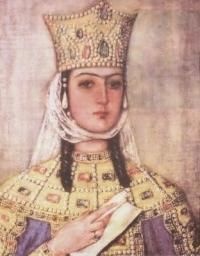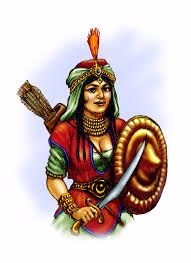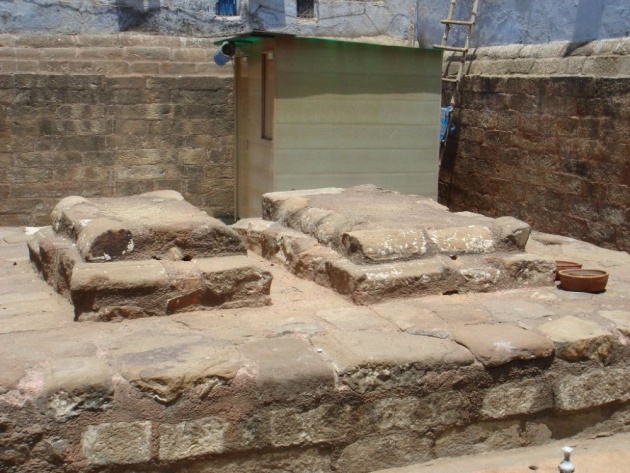

 Razia Sultana.
Razia Sultana.
She was the Sultana of Delhi in India from 10 November 1236 — 14 October 1240.She was famously the only female ever to rule the Delhi Sultanate.
Early Life.
Raziya was born the daughter of Shams-ud-din Altamush, who had begun life as a Turk slave and ended it as Sultan of Delhi himself. Iltutmish had been a great favorite of his master, Qutb ud-Din Aibak, Sultan of Delhi, and he got his daughter, Qutub Begum, married to Iltutmish ( or Altamush) . Qutub Begum, was the mother of Razia, and Razia was thus a maternal granddaughter of the Qutb ud din Aibak. Razia thus grew up in privileged circumstances and close to the levers of power both within the harem (where her mother was dominant) and in court, where she was a favorite of both her maternal grandfather and her father. This was in contrast with her step-brothers, most of who were the sons of former slave-girls, and who grew up quite distant from the centers of power.
When Razia was five years old, her maternal grandfather died and was succeeded by Iltutmish. Razia was a favorite of her father, and as a child was allowed to be present around him while he dealt with affairs of state. Later, like some other princesses of the time, she was trained to administer a kingdom if required, in the absence of father or husband.[2] Her abilities and diligence, no less than her mother's royal lineage, commended Razia to Iltutmish and made her a confirmed favorite with him. Nevertheless, it was his eldest son, Naseeruddin Mahmud, who was groomed by Iltutmish to succeed him.
However, Nasiruddin Mahmud died suddenly in 1229 CE, and Iltutmish was at a loss as to a successor, because he felt that none of his several surviving sons, born of his other wives, was worthy of the throne. In 1230, he had to leave the capital in order to lead an invasion against Gwalior. During his absence, Razia acted as a competent regent, with the assistance of the Sultan's trusted minister. Iltutmish returned to Delhi in 1231 after having captured Gwalior, and the issue of succession was foremost on his mind.
Iltutmish became the first sultan to appoint a woman as his successor when he designated his daughter Razia as his heir apparent. Razia was the first and last female ruler of Delhi Sultanate. (According to one source, Iltumish's eldest son had initially been groomed as his successor, but had died prematurely.) But the Turkish nobility had no intention of acceding to Iltutmish's appointment of a woman as heir, and after the sultan died on Wednesday 30 April 1236, Razia's brother, Rukn ud din Firuz, was elevated to the throne instead.
Ruknuddin's reign was short. With Iltutmish's widow Shah Turkaan for all practical purposes running the government, Ruknuddin abandoned himself to the pursuit of personal pleasure and debauchery, to the outrage of the citizenry. On November 9, 1236, both Ruknuddin and his mother Shah Turkaan were assassinated after only six months in power. With reluctance, the nobility agreed to allow Razia to reign as Sultan of Delhi.
She "abandoned the veil and adopted masculine attire." She was an efficient ruler and possessed all the qualities of a monarch. According to Minhaj-i-Siraj, she was "sagacious, just, beneficient, the patron of the learned, a dispenser of justice, the cherisher of her subjects, and of warlike talent, and endoweed with all the admirable attributes and qualifications necessary for a king. She is also famous for her romantic involvement and legends with her lover and later turned husband, Malik Ikhtiar-ud-din Altunia.
Conspiracy for Downfall
The Turkish nobles now formed a plan of an organized resistance. They wanted to weaken royalty permanently vis-a-vis the nobility. The leader of this conspiracy was Malik Ikhtiar-ud-din Altunia who had risen from the office of the governor of Badaun. Altunia felt that no large-scale rising was possible in Delhi as long as the queen was present there because of her precautionary measures. The plans were therefore laid out with great care. Malik Ikhtiar-ud-din Altunia the governor of Bhatinda, first raised the standard of revolt. Razia immediately proceeded against him at the head of an army. Altunia and his fellow-conspirators captured Razia. She was entrusted to the care of Altunia and the rest of the nobles returned to the capital
Love life and Marriage
Razia and Malik Ikhtiar-ud-din Altunia, the governor of Bhatinda were childhood friends, some recognize them as childhood sweethearts who were strongly in love with each other. However, when he was in Bhatinda the Turks spread rumors about Yaqut Jamal-ud-Din Yaqut, an Abyssinian Siddi (Habshi) slave, which triggered the wrath and jealousy within Altunia and he led a rebellion against her, simply with the intention of getting her back.
A battle between Razia and Altunia ensued, with the result that Yaqut was killed and Razia taken prisoner.She was incarcerated in April, 1240 at Qila Mubarak at Bathinda. While in prison, Razia Sultan was allowed to go to Hajirattan mosque to offer prayers on Fridays in a special palki. She was kept in royalty and Altunia visited her regularly, it was then that their love triumphed and finally she was released in August 1240. Razia won over Altunia with love and married him.
Death
Meanwhile, Razia's brother, Muizuddin Bahram Shah, had usurped the throne. After Altunia and Razia undertook to take back the sultanate from Bahram through battle, both Razia and her husband were defeated on the 24th of Rabi' al-awwal A.H. 638 (October 1240). They fled Delhi and reached Kaithal the next day, where their remaining forces abandoned them. They both fell into the hands of Jats and were robbed and killed on the 25th of Rabi' al-awwal A.H. 638,[8] this date corresponds to October 13, 1240.Bahram, for his part, reigned from 1240 to 1242, but would be dethroned for incompetence.
The place of Razia's burial is disputed by historians. There are 3 places where Razia is claimed to be buried. They are Delhi, Kaithal and Tonk, Rajasthan.
Legacy
Razia is said to have pointed out that the spirit of religion was more important than its parts, and that even the Islamic prophet Muhammad spoke against overburdening the non-Muslims. On another occasion, she reportedly tried to appoint an Indian Muslim convert from Hinduism to an official position but again ran into opposition from the nobles.
Razia was reportedly devoted to the cause of her empire and to her subjects. There is no record that she made any attempt to remain aloof from her subjects, rather it appears she preferred to mingle among them.
Razia established schools, academies, centers for research, and public libraries that included the works of ancient philosophers along with the Qur'an and the traditions of Muhammad. Works in the sciences, philosophy, astronomy, and literature were also reportedly studied in schools and colleges.
I Hope you that you will like my blog :)



